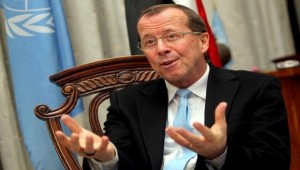 UN Special Envoy for Libya, Martin Kobler, told the UN Security Council that this year should be the “year of decisions and political breakthrough” for the North African country that has been marred with chaos since 2011.
UN Special Envoy for Libya, Martin Kobler, told the UN Security Council that this year should be the “year of decisions and political breakthrough” for the North African country that has been marred with chaos since 2011.
While admitting that providing security under one army continues to be one of the major challenges of the UN-backed Government of National Accord (GNA), Kobler called for empowering national security institutions because “there are no alternatives” to demobilize armed groups without “a strong army and police.”
The GNA is backed by the UN but it has very limited influence on the ground. The GNA is also weakened by the divisions in the Presidential Council (PC), its leadership body, with its nine members prone to making contradictory statements. Two of its members have been boycotting proceedings.
According to Kobler, there has been an improvement because of a “growing consensus to adapt” its composition. PC’s members represent the different geographical regions and political currents in the country.
As part of efforts to end the war, there are plans for “a limited amendment to the Libyan Political Agreement” considering that Libyans “deserve security and an end to the rampant crime and lawlessness.”
Also, voices are rising that Field Marshall Khalifa Haftar “must have a role” in a unified Libyan army and there are expectations that Russia will facilitate communication with him. Haftar is loyal to the Tobruk-based House of Representatives that must approve the Libyan Political Agreement in order to make the GNA legitimate.
Following the successful ousting of the Islamic State in Sirte, concerns still remain over the country’s porous borders because terrorists, human and weapons traffickers, and criminal gangs could continue to exploit the security vacuum.
